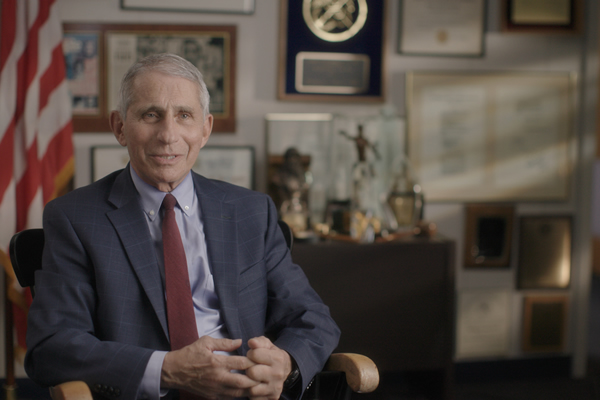
For those who lived through the AIDS epidemic, the onset of COVID-19 in early 2020 was accompanied by an inescapable air of déjà vu. There were plenty of reasons for this, of course: it was a terrifying new disease, not much was known and even less understood about how it spread, there was no effective treatment or cure available, the government’s response to it sparked a political firestorm, and—most significantly—lots of people were dying. As if all that weren’t enough, right in the middle of the public conversation about it was the same familiar face, none other than Dr. Anthony Fauci himself.
For many who worked as activists during the peak years of that earlier epidemic, Fauci was the adversary. Then, as now, he found himself in the crosshairs of a whole angry sector of society, bearing the brunt of the anger that arose from their fear of an uncertain future and becoming, once again, one of the most polarizing public figures in American politics, without even being a politician. Ironically, this time around, instead of being perceived as the face of government inaction and establishment obstructionism, he has been elevated to the status of progressive icon.
To understand how that seeming transformation is possible—as well as to look past the surface parallels between cultural response to the two plagues and see the profound differences instead—it’s necessary to look past the broad strokes of the headlines and the two-line bios that make up most of the knowledge most Americans have about AIDS, COVID and Fauci, and get a more detailed knowledge of the history that links them all together. Fortunately, a new National Geographic documentary, which began streaming on Disney Plus on Oct. 6, is here to provide exactly that.
The film came about when two filmmakers, Emmy-winners John Hoffman and Janet Tobias, joined forces after being separately inspired to make a film about Fauci, who, for those who have been in an isolation module for the past 40 years, was appointed director of the National Institute of Allergy and Infectious Diseases (NIAID) in 1984 and has advised seven presidents on domestic and global health issues during the decades since. Aided by unprecedented access to their subject, who was not only supportive but fully cooperative, along with access to decades of deep archival material and a wide array of prominent public figures eager to participate, the result of their collaboration is an impressive piece of cinematic journalism titled, simply, “Fauci.”
Starting out with a humanizing overview of Fauci’s early life, the film offers us a protagonist whose dreams of a private Park Avenue practice gave way to a passion for the study of infectious diseases, and whose enduring marriage to Dr. Christine Grady began with a “meet-cute” that would have been right at home in a Hollywood rom-com. It then tracks his professional career, not just the two epidemics that have bookended his time in public service to date, but details from the intervening years that most people have either forgotten or never known, like his efforts in stemming the threat of Ebola when it began to appear in the U.S., and his role in ensuring global action to the AIDS crisis that was unfolding in Africa and the Caribbean.
Still, it’s inevitable that the documentary concentrates most of its attention on his most famous contributions—spearheading the fights against AIDS and COVID in America—and it does so by highlighting the aforementioned parallels between the two epidemics while also giving us a Fauci’s-eye view of how each played out. Throughout, we go back and forth across the decades, with the help of news footage and extensive interviews, to gather insight from the defining moments of each of these historic public health battles; we are reminded that, while Fauci was seen as the opposition by ACT UP and other AIDS activist organizations seeking to speed up the availability of drugs and treatment for HIV. He also listened to their concerns and learned from them. Bucking resistance from his colleagues, he gave activists and community members directly affected by AIDS a seat at the table and opened the door for their participation in designing the clinical trials that would ultimately bring the life-preserving drug cocktails that stopped a positive diagnosis from being a death sentence. While social media feeds over the past two years have been full of anti-Fauci posts reminding us of his early obstructionism in the AIDS fight, few have bothered to include the rest of that story, but “Fauci” sets the record straight.
In focusing on this end of history, however, the movie gives us a refresher course—as if one was needed—on the unprecedented level of opposition Fauci faced from the very administration it was his job to serve in the campaign against COVID. It reveals the pressures put on Fauci and his family by the vitriolic hatred of his detractors, the hardships imposed on his life and routine by the security protocols enacted in response to the death threats that come as a natural consequence of being used as a political scapegoat. And it makes quite clear that those who protest his methods this time around are working from a very different motivation than the one that drove the heroes of ACT UP.
More important than any of this, perhaps, is the chance “Fauci” gives us to get to know the man himself. The filmmakers position him squarely in his rightful place at the center of their movie, allowing us a look past the professional veneer that has become a fixture on news broadcasts and at press conferences. What we see there is the man we know, amplified by the freedom to let his compassion, his humanity, his intelligence, and yes, his sense of humor show. It’s a winning portrait that never rings false, and the eager participation of a widely varied crowd of interviewees to sing his praises—from George W. Bush to Susan Rice to Peter Staley to Bono—only reinforces its sincerity.
Of course, those who dislike Fauci are unlikely to be swayed by the sympathetic portrait offered by Hoffman and Tobias’ film—which, though it, like Fauci himself, is candid in acknowledging his missteps along the way, offers little in the way of negative commentary about its subject—and will doubtless brush it aside as “woke” propaganda. To answer that phenomenon, it might be best to offer a quote from the good doctor about why he is so hated by his critics. “I represent something that is uncomfortable for them. It’s called the truth.”








